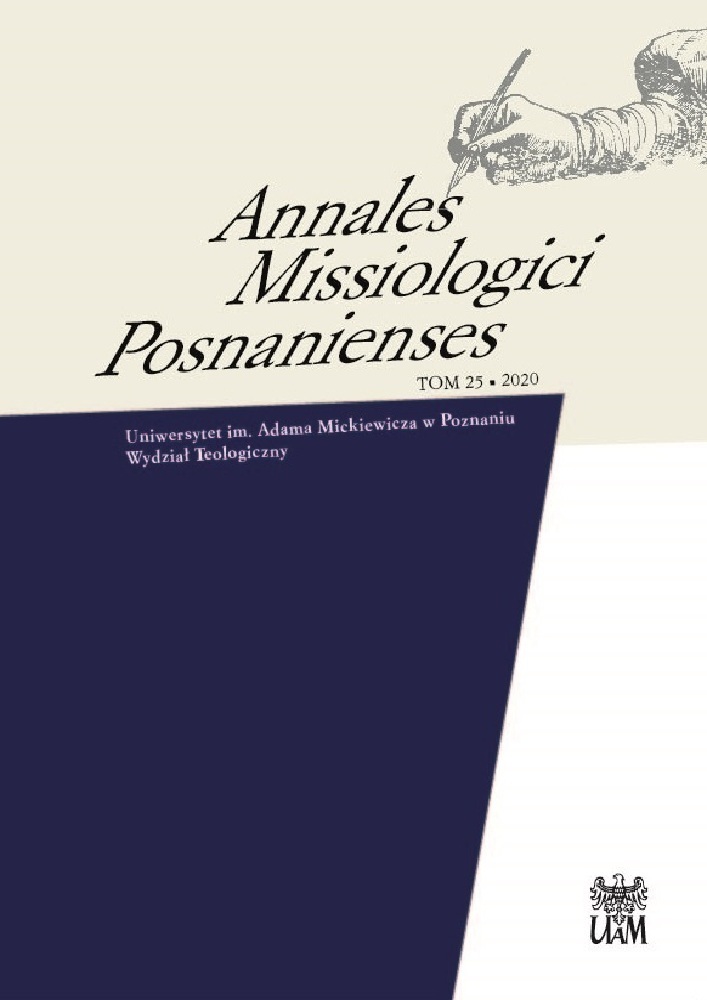Abstract
The article shows the diffi cult problem of how to renew the dialogue between the Catholic Church, present in Bolivia since the sixteenth century and the populist regime of Evo Morales, nowadays expelled by the Bolivian opposition from his own country. The painful division of the Bolivian society into several distinctly separate groups is a huge missionary challenge for the Catholic Church in Bolivia. Catholicism cannot look indiff erently at the many social experiments conducted in the area of this very poor Andean country. What is required, is a radical change of the spiritual formation, which will lead effi ciently to a renewed reception of the Gospel in the free heart of the Bolivian nation.
References
Agencia AFP y Reuters. „Bolivia se encamina a elecciones sin Evo Morales.” La Nación. 24 de Noviembre 2019: 6.
Alenda, Stéphanie. „El malestar democrático (1985-2004).” Balance de las democracias latinoamericanas: incertidumbres y procesos de consolidación (2004) 42: 155-178.
Archondo, Rafael. „La ruta de Evo Morales.” Nueva Sociedad (2007) 209: 82-99.
Arguedas, Alcides. Pueblo enfermo. La Paz: Ediciones Puerta del Sol, 1986.
Bataillon, Gilles. „Bolivie: situation du governement d’Evo Morales.” Problémes d’Amerique Latine (2008) 69: 7-10.
Burman, Andrés. Descolonización aymara. Rotualidad y política (2006-2010). La Paz: Plural Editores, 2011.
Canovan, Margaret. „Trust the people! Populism and the two faces of democracy.” Political Studies XLVII (1999): 2-16.
Drake, Paul. „Comentarios al artículo de Robert Kaufman y Barbara Stalings Dornbusch. El populismo en perspectiva.” Macroeconomía del populismo en América Latina. Red. Rudiger Dornbush. México: Fondo de cultura económica, 1992.
Errejón Galván, Iñigo. „La victoria siempre incompleta. Perspectivas políticas tras el referendum constitucional.” Viento del Sur (2009) 102: 23-31.
Garretón, Antonio. „Modelos y liderazgos en América Latina.” Nueva Sociedad (2006) 89: 102-113.
Germani, Gino. Di Tella, Ianni. Populismo y contradicciones de clase en Latinoamérica. México: Ediciones Era, 1973.
Giddens, Anthony. La constitución de la sociedad. Buenos Aires: Amorrortu, 1995.
Górzna, Sylwia. „Inkulturacja w nauczaniu papieża Jana Pawła II i w dokumentach kurii rzymskiej.” Studia Elbląskie XVIII (2017): 525-536.
Gurr, Ted Robert. Why men rebel? Princeton: Princeton University Press, 1970.
Hermet, Guy. Populismo, democracia y buena gobernanza. Barcelona: El Viejo Topo, 2008.
Jan Paweł II. „Niech kontynent nadziei będzie także kontynentem życia. Homilia w czasie Mszy Świętej w bazylice Matki Bożej z Guadalupe (Meksyk, Guadalupe, 23 stycznia 1999).” Salvatoris Mater 2.1 (2000): 320-321.
Laclau, Ernesto. La razón populista. Argentina: Fondo de Cultura Económica, 2007.
Mainwaring, Scott. Torcal, Mariano. „La institutionalización de los sistemas de partidos y la teoría del sistema partidista después de la tercera ola democrátizadora.” América Latina Hoy (2005) 41: 141-173.
Marsch, David. Stoker, Gerry. Teoría y métodos de la ciencia política. Madrid: Alianza, 1997.
Mény, Yves. Surel, Yves. „La costitutiva ambiguitá del populismo.” Trasgressioni (2002) 34: 3-20.
Oberschall, Anthony. Social confl ict and social movements. New Jersey: Prentice–Hall, 1973.
Orlandis, José. La Iglesia Católica en la segunda mitad del siglo XX. Madrid: Eds. Palabra, 1998.
Ostheimer, Jochen. „Ład społeczny. Zasada pomocniczości i jej znaczenie dla społeczeństwa obywatelskiego.” Zeszyty Naukowe KUL (2013) 56: 27-46.
Salinero Rates, Mónica Inés. Populismo en América Latina. Análisis comparado de los factores que potencian o debilitan la discrecionalidad de la representación populista en el gobierno: los casos de Venezuela y Bolivia. Barcelona: Universitat de Barcelona, 2015.
Szyszka, Tomasz. „Historia ewangelizacji Charcas (Boliwia) w XVI-XVIII wieku.” Nurt SVD (2013) 2: 92-122.
Velarde Rosso, Jorge Eduardo. „Iglesia – religión – Estado en el gobierno de Evo Morales.” Ciencia y Cultura (2011) 26: 129-144.
Zapata, Álvaro. Ciudadanía, clase y etnicidad. Un estudio sociológico sobre la acción colectiva en Bolivia a comienzos del siglo XXI. La Paz: Ediciones Yachayawasi, 2006.
License
Copyright (c) 2020 Jarosław Tomaszewski

This work is licensed under a Creative Commons Attribution-NoDerivatives 4.0 International License.
PUBLISHED WORK ARE LICENSED UNDER A CREATIVE COMMONS:
Before 2006 all published texts are copyrighted.
Authors
Authors of texts accepted for publication in the journal Annales Missiologici Posnanienses are required to complete, sign and return to the editorial address an agreement to grant free license to works, with an obligation to grant CC sublicense.
According to the agreement, the authors of the texts published in the journal Annales Missiologici Posnanienses grant to Adam Mickiewicz University in Poznan a non-exclusive and royalty-free licencji Creative Commons Attribution-NonCommercial-NoDerivatives 4.0 International (CC BY-NC-ND 4.0) license and allow sublicensing under the same conditions.
The authors retain the rights to further freely dispose of the work.
Users
Interested internet users are entitled to use works published from 2021 onwards in Annales Missiologici Posnanienses under the following conditions:
- Attribution - the obligation to provide with the distributed work, information, about the authorship, title, source (links to the original work, DOI) and the license itself;
- Non-commercial use - you should not use the work for commercial purposes;
- Without creating derivative works - the work must be preserved in its original form, e.g. translations, adaptations may not be distributed without the author's permission.
Interested Internet users are entitled to use works published between 2006 and 2020 in Annales Missiologici Posnanienses under the following conditions:
- acknowledgment of authorship - the obligation to provide with the distributed work, information, about the authorship, title, source (links to the original work, DOI) and the license itself;
- without creating derivative works - the work must be preserved in its original form, e.g. translations, adaptations cannot be distributed without the author's consent.
Other
Adam Mickiewicz University of Poznan retains the right to the journal as a whole (layout, graphic form, title, cover design, logo, etc.).



